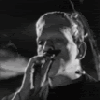tonetti

Joined: Aug 20, 2008
Posts: 654
California
|

Posted on Sep 13 2008 02:53 PM
JakeDobner
Albums should be recorded as best they can. You know what happens then? If the song is great then you get the best possible result. Is there such a thing as a song that is recorded too well? Because personally, I would just say that song is either boring or it sucks.
Agreed. I dont think a song can be recorded too well, but I think a bands sound can be manipulated in the studio in such a way, that they dont sound like themselves anymore.
|
djangodeadman

Joined: Jan 25, 2007
Posts: 1568
Brighton UK




|

Posted on Sep 19 2008 08:28 AM
JakeDobner
Sure it may be cool to listen to an album that has artifacts and such, but for any band making a new album, do you really want your album to sound like that? I just can't imagine trying to make something that didn't sound as good as possible. Of course we did record into digital, but that is only because of time contraints. And recording to tape is great, but we recorded into a really great board and at 192khz.
Did you record it for bats to listen to?
— Los Fantasticos
|
JakeDobner

Joined: Feb 26, 2006
Posts: 12159
Seattle



|

Posted on Sep 19 2008 09:08 AM
192khz doesn't refer to the audio spectrum frequency. It is the sampling rate, which means how many samples per second. CDs are 44.1khz regardless of how it was recorded and vinyl is 96khz. This is why vinyl sounds better than CDs. Needless to say the recordings at 192khz sounded amazing. Also, this is why after we mixed we downsampled to 44.1khz onto a CD and listened on a CD player just to make sure the mix still sounded alright. Big difference.
|
MissingLink

Joined: Jul 23, 2008
Posts: 488
Edge of the East China Sea


|

Posted on Sep 19 2008 09:33 AM
tonetti
I dont know how many times I have heard a CD, and then saw the band, and said to myself "these guys really sound like shit live" Does anyone here agree?
Yes. I know people will argue fiercely against this position, preferring the spontaneity, energy, or whatever, of a live performance or recording of a live performance -- I've had this debate before! Honestly, though, I've always wondered why people spend money on an 'inferior' (live)version of a well-produced song. In short, yes, I have at times been disappointed by live performances.
Strangely, though, I'd just as soon hear an old, primitive-sounding record. If I'm listening to some obscure rockabilly tune from '56, I sure don't want it sounding like a Madonna CD. To be fair, I'm not in a band and I don't record. Perhaps I would feel differently -- be less of a primitivist -- if I knew that people were going to buy my stuff and listen to it over and over on a good stereo. This said, I'm genuinely puzzled by the obsession with vintage-correct guitars, amps, and tanks being played into the best, most modern recording equipment.
|
Jon

Joined: Mar 15, 2006
Posts: 1076
Columbus, OH

|

Posted on Sep 19 2008 09:39 AM
I've always been used to recording on an old Tascam 4-track, which usually let in some outside noises and was pretty sloppy. Lately, however, my friend and I have been using his new macbook pro. We've never had a better, cleaner final product. It's really nice.
Also, sometimes dogs howl when I play. Because I'm awesome.
|
JakeDobner

Joined: Feb 26, 2006
Posts: 12159
Seattle



|

Posted on Sep 19 2008 11:34 AM
MissingLink
tonetti
, I'm genuinely puzzled by the obsession with vintage-correct guitars, amps, and tanks being played into the best, most modern recording equipment.
Because they/we aren't going for a vintage sound. We are going for the best sound period and those vintage amps and guitars just sound amazing. They also feel and play better. Nothing like getting your hands around the neck of a 40-50 year old...guitar. And not many people use the most modern recording equipment. You will still find analog boards in many of the top studios. Digital boards just aren't there yet, or so I've read and have been told by engineers that we've worked with.
|
zak

Joined: Sep 24, 2007
Posts: 2728


|

Posted on Sep 19 2008 11:43 AM
This post has been removed by the author.
Last edited: Sep 23, 2009 19:26:12
|
Rio

Joined: May 22, 2006
Posts: 500
Hamilton, Ontario


|

Posted on Sep 19 2008 12:36 PM
I agree that the objective is to create a good sounding, good quality recording, without artifacts or glitches or purposefully trying to downgrade the sound to make it sound "vintage".
At the same time, I can really enjoy the sound of old records, but I've played with former bandmates who just can't get over the technology hump and can't stand listening to some older records because of the sound quality, or you can't hear the bass, or the drums are just coming out of one speaker, or-- heaven forbid-- it's in mono!
I opened on a bill once which included a very talented multi-instrumentalist by the name of Fats Kaplan, who has recorded with many people... LSJ were playing the next night, and he mentioned that he and Eddie Angel had tried recording some songs using a vintage tape machine they had found somewhere. I mentioned this to Eddie the next next, and he made the same comment Fats did, namely, "Yeah, it sounded vintage alright... too vintage".
Anyway, I think vintage is great for listening to original recordings from the '60s and so forth, but it's not necessarily what we want to produce today. That said, I think you can suggest a vintage "vibe" by keeping the recording simple and relatively unadorned, and sticking with "vintage" style effects in the playing and recording (not much besides reverb, trem & compression), and in the instruments used and style of microphone-- not to mention the songs-- but I'd rather use current recording techniques and technology. Even those who record to 2-inch tape will use Protools for editing.
— http://www.facebook.com/?sk=lf#!/rockinrio.delrosa
http://www.facebook.com/?sk=lf#!/TheHighTides
http://www.facebook.com/?sk=lf#!/pages/The-Blue-Demons
|
zak

Joined: Sep 24, 2007
Posts: 2728


|

Posted on Sep 19 2008 12:38 PM
This post has been removed by the author.
Last edited: Sep 23, 2009 19:28:29
|
MissingLink

Joined: Jul 23, 2008
Posts: 488
Edge of the East China Sea


|

Posted on Sep 19 2008 12:58 PM
JakeDobner
MissingLink
, I'm genuinely puzzled by the obsession with vintage-correct guitars, amps, and tanks being played into the best, most modern recording equipment.
Because they/we aren't going for a vintage sound. We are going for the best sound period and those vintage amps and guitars just sound amazing. They also feel and play better.
Makes sense.
|
Kawentzmann

Joined: Feb 27, 2006
Posts: 1062
Berlin, Germany

|

Posted on Sep 19 2008 02:18 PM
MissingLink
JakeDobner
MissingLink
, I'm genuinely puzzled by the obsession with vintage-correct guitars, amps, and tanks being played into the best, most modern recording equipment.
Because they/we aren't going for a vintage sound. We are going for the best sound period and those vintage amps and guitars just sound amazing. They also feel and play better.
Makes sense.
SOme want transparency in the studio some want the studio to color the sound further, where the amps started. To me studio gear is as much musical instruments as reverb units, amps and guitars.
— The Exotic Guitar of Kahuna Kawentzmann
You can get the boy out of the Keynes era, but you can’t get the Keynes era out of the boy.
|
djangodeadman

Joined: Jan 25, 2007
Posts: 1568
Brighton UK




|

Posted on Sep 20 2008 09:47 AM
JakeDobner
192khz doesn't refer to the audio spectrum frequency. It is the sampling rate, which means how many samples per second. CDs are 44.1khz regardless of how it was recorded and vinyl is 96khz. This is why vinyl sounds better than CDs. Needless to say the recordings at 192khz sounded amazing. Also, this is why after we mixed we downsampled to 44.1khz onto a CD and listened on a CD player just to make sure the mix still sounded alright. Big difference.
I know perfectly well what 192 khz refers to. However, there is a relationship between the sampling frequency and the range of the audio frequencies which it is possible to record. As I understand it, the sample rate is twice the highest possible frequency, which is why 44.1 was chosen for CDs, since it is just over twice the frequency of the top limit of most human hearing. Hence the question about bats!
Vinyl is an analogue medium, so your comment about vinyl and 96 khz makes no sense to me. Perhaps you can explain it further.
— Los Fantasticos
|
JakeDobner

Joined: Feb 26, 2006
Posts: 12159
Seattle



|

Posted on Sep 20 2008 10:09 AM
When you go to master and press a CD it uses the 44.1khz sampling rate. When you master and press a vinyl record it uses the 96khz sampling rate. So pretty much since so much data can be held in a vinyl analog groove the 96khz provides more information than a 44.1 mixdown.
|
Kawentzmann

Joined: Feb 27, 2006
Posts: 1062
Berlin, Germany

|

Posted on Sep 20 2008 11:04 AM
Analog mastering doesnt involve sampling rates.
Even if 22khz is at the top of most peoples listening ability, the printing resolution should at least be 10 times as high, you dont want acoustic dices up there in you ears.
— The Exotic Guitar of Kahuna Kawentzmann
You can get the boy out of the Keynes era, but you can’t get the Keynes era out of the boy.
|
djangodeadman

Joined: Jan 25, 2007
Posts: 1568
Brighton UK




|

Posted on Sep 20 2008 12:43 PM
JakeDobner
When you go to master and press a CD it uses the 44.1khz sampling rate. When you master and press a vinyl record it uses the 96khz sampling rate. So pretty much since so much data can be held in a vinyl analog groove the 96khz provides more information than a 44.1 mixdown.
This is simply not true. Vinyl is analogue; sampling rates have no meaning in this context.
It does seem to be the case that vinyl may be able to reproduce some audio frequencies above those possible for CD, but we cannot hear them, as exlained previously.
CDs do, however, have a wider dynamic range than vinyl (not that you'd know this from the way that much modern music is mastered - leaving as little dynamic range as possible!).
The reason that some people prefer the sound of vinyl to CD is that the medium imparts something inherently musical (distortion) to the sound, which we perceive as warmth, or somesuch. Digital systems cannot do this (digital distortion is an altogether different beast and thoroughly unpleasant), which is why there are all sorts of digital plug-ins designed to mimic analogue warmth, tape saturation etc etc.
Anyway, I don't want to start an argument or anything. My comment about bats was largely flippant. There may well be good reasons for recording at higher sampling rates than the final delivery medium allows for. I'd be interested to know how many of us can truly hear the difference between, say, a 96 khz recording and a 192 khz recording, though. Maybe we should try and find a way of carrying out some blind tests.
— Los Fantasticos
|
Kawentzmann

Joined: Feb 27, 2006
Posts: 1062
Berlin, Germany

|

Posted on Sep 20 2008 05:21 PM
I want an accurate curve description, not just to two bits going on and off.
— The Exotic Guitar of Kahuna Kawentzmann
You can get the boy out of the Keynes era, but you can’t get the Keynes era out of the boy.
|
LHR

Joined: Aug 23, 2006
Posts: 2123
The jungle









|

Posted on Sep 20 2008 08:40 PM
djangodeadman
JakeDobner
When you go to master and press a CD it uses the 44.1khz sampling rate. When you master and press a vinyl record it uses the 96khz sampling rate. So pretty much since so much data can be held in a vinyl analog groove the 96khz provides more information than a 44.1 mixdown.
This is simply not true. Vinyl is analogue; sampling rates have no meaning in this context.
It does seem to be the case that vinyl may be able to reproduce some audio frequencies above those possible for CD, but we cannot hear them, as exlained previously.
CDs do, however, have a wider dynamic range than vinyl (not that you'd know this from the way that much modern music is mastered - leaving as little dynamic range as possible!).
The reason that some people prefer the sound of vinyl to CD is that the medium imparts something inherently musical (distortion) to the sound, which we perceive as warmth, or somesuch. Digital systems cannot do this (digital distortion is an altogether different beast and thoroughly unpleasant), which is why there are all sorts of digital plug-ins designed to mimic analogue warmth, tape saturation etc etc.
Anyway, I don't want to start an argument or anything. My comment about bats was largely flippant. There may well be good reasons for recording at higher sampling rates than the final delivery medium allows for. I'd be interested to know how many of us can truly hear the difference between, say, a 96 khz recording and a 192 khz recording, though. Maybe we should try and find a way of carrying out some blind tests.
The reason vinyl sounds better, IMO, is that, unlike music sampled at 44.1 KHz, it does not lose information in the upper frequency range due to interpolation. This of course is the opposite of a perceived "warmth".
— SSIV
|
djangodeadman

Joined: Jan 25, 2007
Posts: 1568
Brighton UK




|

Posted on Sep 21 2008 03:05 AM
LHR
djangodeadman
JakeDobner
When you go to master and press a CD it uses the 44.1khz sampling rate. When you master and press a vinyl record it uses the 96khz sampling rate. So pretty much since so much data can be held in a vinyl analog groove the 96khz provides more information than a 44.1 mixdown.
This is simply not true. Vinyl is analogue; sampling rates have no meaning in this context.
It does seem to be the case that vinyl may be able to reproduce some audio frequencies above those possible for CD, but we cannot hear them, as exlained previously.
CDs do, however, have a wider dynamic range than vinyl (not that you'd know this from the way that much modern music is mastered - leaving as little dynamic range as possible!).
The reason that some people prefer the sound of vinyl to CD is that the medium imparts something inherently musical (distortion) to the sound, which we perceive as warmth, or somesuch. Digital systems cannot do this (digital distortion is an altogether different beast and thoroughly unpleasant), which is why there are all sorts of digital plug-ins designed to mimic analogue warmth, tape saturation etc etc.
Anyway, I don't want to start an argument or anything. My comment about bats was largely flippant. There may well be good reasons for recording at higher sampling rates than the final delivery medium allows for. I'd be interested to know how many of us can truly hear the difference between, say, a 96 khz recording and a 192 khz recording, though. Maybe we should try and find a way of carrying out some blind tests.
The reason vinyl sounds better, IMO, is that, unlike music sampled at 44.1 KHz, it does not lose information in the upper frequency range due to interpolation. This of course is the opposite of a perceived "warmth".
There may be truth in that.
I don't know anything about cutting lathes, but I wonder if Jake is referring to the fact that the cutting house are able to work with files at 96 khz, meaning that his 192 khz mixes only need rsampling to 96 khz in the mastering stage, whereas they have to be resampled to 44.1 for CD production.
— Los Fantasticos
|
djangodeadman

Joined: Jan 25, 2007
Posts: 1568
Brighton UK




|

Posted on Sep 21 2008 03:11 AM
Kawentzmann
I want an accurate curve description, not just to two bits going on and off.
In that case, of course, you would record to analogue tape, not to any digital medium, whether at 44.1 96 or 192 khz, which is fair enough. We generally like the sound of analogue systems.
— Los Fantasticos
|
dannylectro

Joined: Aug 18, 2008
Posts: 371
Orange, CA




|

Posted on Sep 26 2008 04:51 PM
VINTAGE ALL THE WAY!!! Modern recording sounds great, FOR TECHNO POP! Not for surf... 
|


































